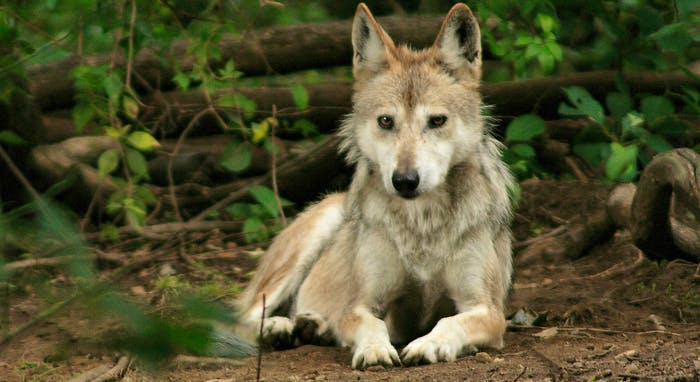Defenders helps ready a pack of Mexican gray wolves for release in Mexico
By the time we reached the one-acre pen holding the family of Mexican gray wolves on Ted Turner’s Ladder Ranch in New Mexico, the morning sun had crested the San Andreas Mountains to the east, illuminating the cottonwoods and sycamores in the valley below.
We parked the trucks a few hundred yards away and walked the temporary holding crates to the enclosure, but the wolves were already well aware of our presence. As we entered, they nervously circled the pen’s rocky terrain, skittishly stealing glances while keeping a comfortable distance. The excitement among our group of twenty (which included U.S. Fish and Wildlife Service staff, biologists from the Ladder Ranch, students from New Mexico State University, high school students and members of the local community) was palpable.
Preparing One Wolf Family for Their Journey
The night before, I had made the drive from Santa Fe to southern New Mexico to help the U.S. Fish and Wildlife Service (FWS) Recovery Team vaccinate and issue final health checks for a family of eleven Mexican gray wolves that would be released in the wild in Mexico a few weeks later. Their release would be the culmination of a months’ long journey that began at Wolf Haven International, a sanctuary outside Olympia, Washington.
In February, the New Mexico game commission granted a permit for five wolves, which included an alpha male and female and three pups, to be transported to the Ladder Ranch in April after the alphas had mated again. The mating was successful and later in the spring, six new pups joined the pack. Since then, the alpha pair has been raising their new pups while USFWS finalized the permits required for release in the wild.
As a volunteer, my job was to help corral the wolves, three or four at a time, into the small kennel connected to the larger holding pen. Each volunteer was equipped with either a large wooden board or metal pole to create a human wall and guide the wolves into the kennel where FWS staff and veterinarians could administer the series of shots, blood draws and other health checks to make sure the wolves were ready for release.
Entering the enclosure, we followed the fence line, downhill to the bottom of the pen. Standing as close to one another as possible, we then advanced slowly, moving the wolves uphill towards the kennel area. On our first attempt, three wolves found their way to the kennel with the door shutting quickly behind them. The second attempt was equally effortless. But by the third round, only three wolves, including the alpha male, remained in the enclosure, making it far more difficult to coax them into the kennel.
With our human wall intact, the alpha male paced side-to-side, looking for an opening through which to escape. Skirting under a juniper, he broke our wall, but within a few minutes, he took refuge in the kennel and our work was done.
Once in the kennel, FWS biologists and veterinarians placed a blind over each wolf and handled the animal as quickly as possible, ever mindful of how each wolf was coping with the stressful encounter. Once the check-up was finished, the wolves were put in traveling crates and placed in the shade so the others could be corralled and processed.
At the end of the day, we carried the crates back into the pen and opened the doors all at once. Some of the wolves immediately bolted from their crates back to the comfort of holding pen while others, still stressed from the encounter, remained in their cages a few minutes longer before rejoining their mates.
A Shared Responsibility for Recovery
Undoubtedly, the idea of eleven wolves that have been born and bred in captivity finally making it into wild inspires hope. Over the past several years, Mexico has increasingly embraced the role it can play in recovering the lobo, requesting more captive wolves for release. We are thankful for partners like the Ladder Ranch and heartened to see Mexico assume this larger role by welcoming the release of this imperiled species for whom the greatest roadblock to recovery remains human acceptance. This has been especially important given the moratorium on releases in New Mexico. At the same time, we cannot take advantage of our southern neighbor’s willingness to do its part and simply ignore our responsibility to recover this unique subspecies of gray wolves here in the United States as well. These wolves are native to both countries, and should be restored to both.
Two months ago, a federal judge finalized a court settlement between a coalition of environmental groups led by Defenders and the U.S. Fish and Wildlife Service that requires the agency to complete a revised recovery plan by November 2017. While this is welcome news, we still do not know if that recovery plan will contain all the elements that scientists have identified as necessary for Mexican gray wolves to recover, including the release of more wolves in more habitat north of I-40.
Already, the governors of Colorado and Utah have expressed their opposition to having wolves released within their borders, while Arizona and New Mexico’s governors have repeatedly opposed having any wolves north of Interstate-40.
Scientific studies have demonstrated the need for additional populations of wolves to ensure the species’ long-term survival. Other studies have identified northern New Mexico and southern Colorado, as well as northern Arizona and southern Utah, as suitable locations for these populations. But even though Mexico lacks the public lands or prey-base to support a significant population of wolves, state politicians want our southern neighbors to do the job that we have already committed to do. That’s why Defenders of Wildlife will be fighting, now more than ever, to ensure USFWS follows the science and does everything necessary to fully recover our lobos. We need more wolves and less politics.



